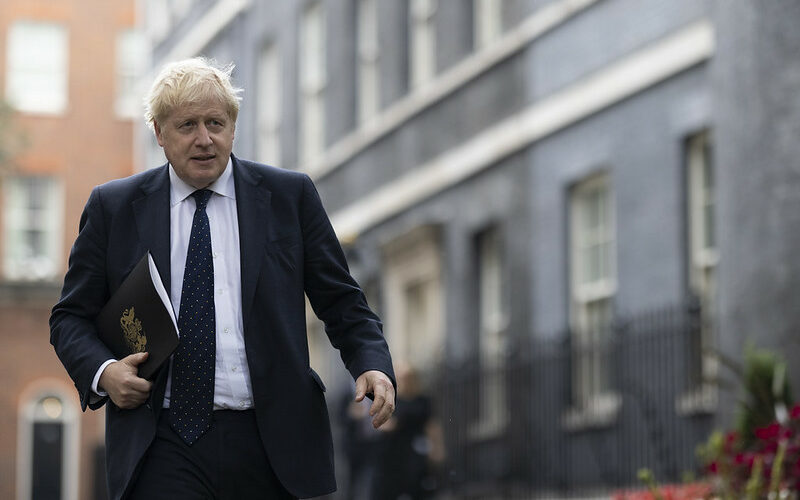Anxious white men look to bonds of 'blood and history' in AUKUS
September 20, 2021
Apprehensive of loss, the leaders of white men’s countries are invoking pride of race to spruik the AUKUS alliance to secure their primacy of place over China in a fast-changing world.
When British Prime Minister Boris Johnson addressed the House of Commons about the new AUKUS strategic and security alliance between Australia, the United Kingdom and United States, he explained the plan to provide nuclear-powered submarines to Australia as based on deep “trust” arising from “blood and history”.
What seemed like a radical new departure was, in fact, he reassured his parliamentary colleagues, anchored in centuries-old ties of kinship.
As an enthusiastic Anglo-Saxonist, Johnson is an admirer of Winston Churchills A History of the English-Speaking Peoples and well schooled in earlier histories that mythologized Anglo-Saxons people genius for government, a story that often gave pride of place to the United States.
When the Australian colonies prepared for federation many who contributed most eloquently to the constitutional debates of the 1890s invoked this long “race history” as reason for optimism.
The new Commonwealth was joining a privileged club of white mens countries.
When US President Theodore Roosevelt detoured the Great White Fleet to Australia in 1908 at the special request of prime minister Alfred Deakin, in the context of the rising military power of Japan, the American statesman was keen to oblige.
“Those colonies are white mans country,” he declared.
When the naval fleet arrived in Sydney, Admiral Sperry, knowing how to flatter his hosts, greeted them as “a white man to white men, and may I add, to very white men”.
Deakin in turn spoke of the two nations “mutual sense of kinship, sympathy and solidarity” and his desire for “a perpetual concord of brotherhood” what we might now call a “forever partnership”.
A sense of racial kinship and shared race history bonded these white mens countries. But they also shared, from the 1850s, a sense of threat posed by that composite figure “the Asiatic”, primarily meaning the Chinese and Japanese. It was not just the threat of cheap labour that prompted 19th century immigration restrictions, it was also the apprehension that Chinas vast population 400 million people by the 1880s would surely lead it to become a great power in the world.
Chinese Australian community leaders warned Australian politicians not to discriminate against and humiliate Chinese people.
Unjust treatment would bear bitter fruit and wounds would fester. A time may come, they warned, “when the presence and power of China as a great nation will be felt in these seas”.
One Victorian liberal politician, Charles Pearson who was also a historian took note. In his 1893 work of prophecy, National Life and Character: A Forecast, Pearson predicted: “With civilisation equally diffused, the most populous country must ultimately be the most powerful; and the preponderance of China over any rival even over the United States of America is likely to be overwhelming”.
He proved prescient, but many of his English contemporaries dismissed his forecast, certain that Anglo-Saxon ascendancy around the globe would last forever.
But Australians, more familiar with the expansion of the Chinese empire, the great migrations into the Pacific and Chinese settlement to their immediate north in Singapore, were more worried.
As an assertion of national sovereignty they enacted harsh immigration restriction laws. The first prime minister Edmund Barton held Pearsons book aloft in the first parliament and in support of the Immigration Restriction Bill quoted from its warnings. If they didnt act soon, Pearson had warned, white men would wake to find themselves “elbowed”, “hustled” and “thrust aside” by advancing Asiatics.
Within a decade, following its crushing naval defeat of Russia in 1905 “an Asiatic country had for the first time defeated a European power” Japan replaced China as the greatest perceived threat to Australia.
At Versailles, following World War I, Australian prime minister WM Hughes was most vociferous in encouraging the white mens countries the US, the UK, South Africa to deny the Japanese bid for a racial equality clause to be included in the Covenant of the League of Nations. As an aspiring modern power and an ally of the Britain, Japan felt betrayed and humiliated.
In the decades after World War II, Australia retreated from policies of racial exclusion and in the second half of the century began to seek engagement with countries in Asia, especially Japan and China. Diplomatic ties were strengthened, trade agreements expanded, tourism exploded, immigration diversified and Australia gradually became a multi-cultural country.
China and India became leading sources of migration. Quite suddenly, so it seemed, as Australians we began to reimagine ourselves as at home in the Asia-Pacific. Australian-Chinese relationships in education, business and politics became closer and more extensive. Until very recently.
Suddenly the hostility of Australian political leaders to China has seemed so strident as to verge on the hysterical and war talk has become pervasive and frightening.
Abuse of, and attacks on Chinese Australians and students of Chinese descent have proliferated. The old fear of the Asiatic has returned.
Once again white mens countries are anxious about their place in the world and united in trepidation about Chinas ascendancy as a global power.
For white men loss of power spells humiliation. Once again they look to bonds of “blood and history” they assert their “mutual sense of kinship, sympathy and solidarity” as they did in the past to form a new club called AUKUS to re-assert their global dominance.
Apprehensive of loss, they invoke pride of race to secure their primacy of place in a fast-changing world.

